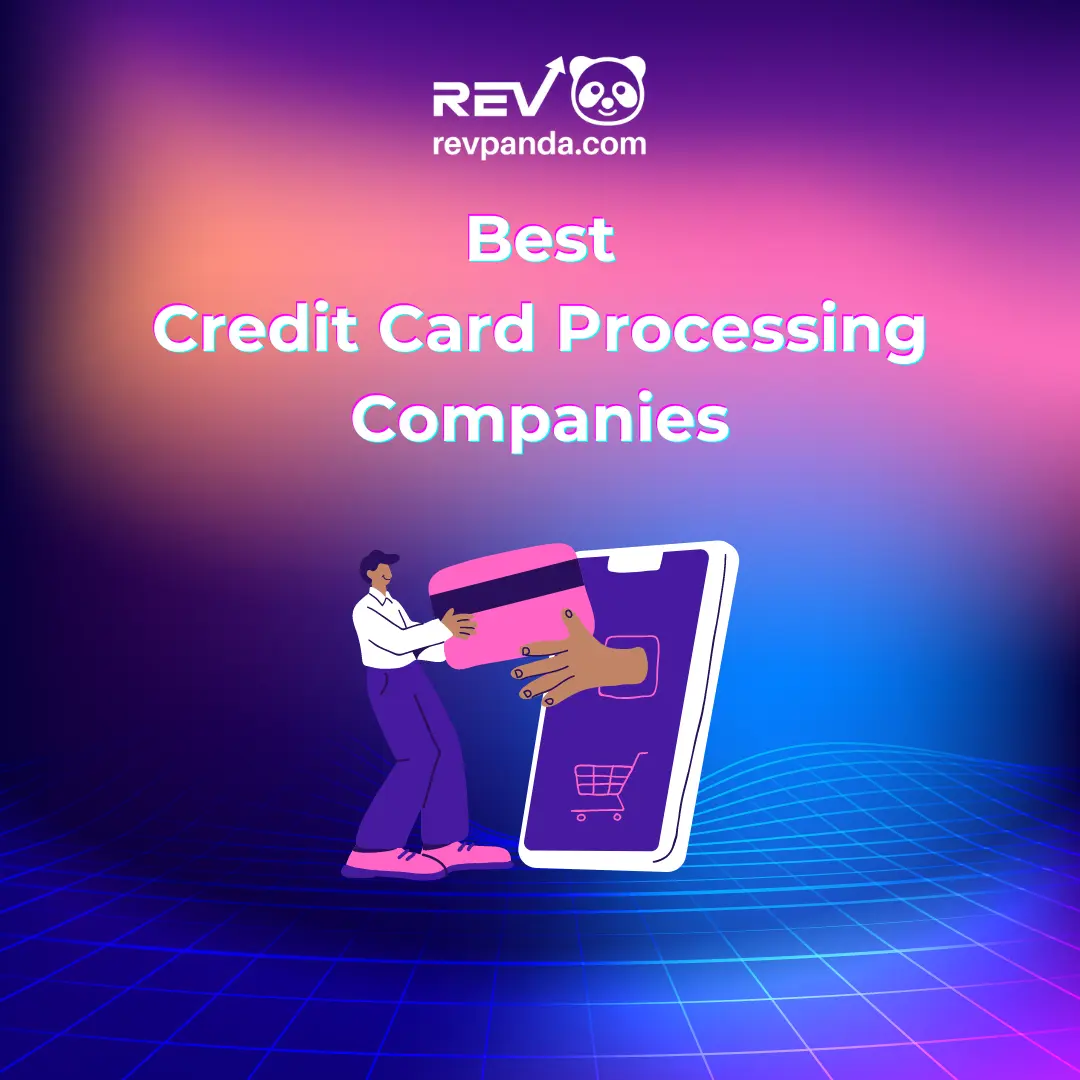
BLOG
Best Credit Card Processing Companies and Merchant Services Providers in 2025
Table of contents
Click on a title to jump to a section
What Is a Credit Card Processing Company?
Businesses that accept credit card payments need three things – a merchant account, payment processors, and payment gateways. Simply put, credit card payment processing companies are third-party service providers that process credit card or debit card payments. They act as a link between businesses or merchants, cardholders, and card networks. The processor helps send money from a card user’s account to the merchant’s business bank account.
By partnering with popular merchant account providers, businesses can ensure smooth online payments or help credit card users pay through a physical POS card terminal. If you were to operate a business without a credit or debit card processor, you would have to stick with cash payments. This is certainly not ideal in a digital era where many people use bank cards.
Best Credit Card Processing Companies
Important Factors to Evaluate to Choose the Right Payment Processor
As a merchant, it’s extremely important to choose a payment processor that suits your business type, transaction volume, and the needs of your customers. Whether you want to accept credit or debit cards, a good company should provide you with everything you need to get paid quickly and safely. The costs of processing payments and merchant agreement terms should also be favourable. Let’s talk about the key factors merchants should always consider when picking the right credit card processing company.

Transaction Fees and Pricing Structure
Compare the credit card processing fees set by various payment processing companies. The transaction fees, minimum monthly service charges, interchange fees, and other costs incurred by merchants should be as low as possible. Establish if the company uses a flat-rate or percentage pricing model and choose based on your business type and sales volume.

Accepted Payment Methods
Check the available payment options when choosing companies that offer credit card payment processing services. The top processors accept Visa, Mastercard, other major credit cards, debit cards, and alternative payment methods like Apple Pay and Google Pay. Remember to look for global and local payment methods, depending on the needs of your customers.

Security and Compliance
Choose payment processors that facilitate secure transactions. All in-person, mobile, and online payments should be protected with advanced security features. These include tokenization and encryption technologies that protect every credit card transaction. Another important consideration is to pick a PCI-compliant payment processor to ensure the safety of the cardholder’s sensitive data.

Integration and Compatibility
Look for reputable payment processors that allow for integration with the most commonly used business software. For instance, compatibility with account software such as QuickBooks and Xero is important for your everyday business operations to run smoothly. Also, a good payment processor should seamlessly integrate with your existing website and POS system.

Customer Support and Service
Carefully examine the quality of customer support service offered by the payment processing company. A reliable processor will provide 24/7 live chat, email, and phone support, regardless of your time zone. The support team must also be knowledgeable and readily available to respond to your queries, provide relevant information, and offer the best solution instantly.

Settlement Period and Payout Schedule
Evaluate the payment processor’s settlement period and payout schedule. As a merchant, you should be able to receive your payments as quickly as possible. Faster payments will certainly have a positive impact on your cash flow. Check for any possible delays and make sure that they don’t have potentially harmful effects on your daily business operations.

Scalability and Growth Potential
Pick a credit card payment system provider with the ability to scale as your business expands. Your growing business should be able to accommodate larger transaction volumes and meet the needs of an increasing customer base. If you want to expand your operations to new markets, the payment processor ought to be flexible enough to provide the needed tools, features, or services.

Reputation and Reliability
Keep in mind that not all companies with credit card processing services have a positive brand name. For this reason, you must make sure that the selected company has a good track record. You should consider its experience in processing payments and what merchants who have used the company’s services say. This means reading testimonials on review sites.

Customisation and Additional Features
Analyse the features offered by different payment processors to choose a company whose services align with your business needs. Look for customisation options that allow you to offer tailored banking solutions to your customers. A top-rated payment processing company will also provide you with additional features such as reporting, invoicing, fraud prevention, and inventory management to improve your overall experience.

Contract Terms and Flexibility
Read the terms and conditions presented by the payment processor before signing the contract. All rules and regulations must be fair and flexible. The key factors to bear in mind include the contract duration, fees, data privacy, renewal, and cancellation terms. Due to the changes that your business is likely to experience in the future, the credit card processing company should have flexible terms that can be adjusted accordingly.
Types of Businesses that Need Merchant Services
Different types of businesses need merchant services to accept credit card payments. This includes companies that want to process in-person, mobile, and web payments. Having a merchant account is especially important if your business accepts non-cash payments.
Whether you are an online retailer or a gaming site looking for gambling payment gateways, you need merchant services to get paid by your customers. With that said, the following list features the top industries that require the services of merchant account providers.
- Retail – This includes online and physical stores that need to accept payments from customers who purchase products using credit cards.
- Restaurants and Cafes – All food and beverage businesses that prefer card payments.
- E-Commerce Sites – Platforms that sell goods, services, and digital products online.
- Professional Services – Professionals who offer in-person and online services.
- Healthcare – Hospitals, healthcare providers, and health facilities where patients pay for consultations and treatment.
- Gaming – Companies or platforms that offer iGaming or gambling services.
- Hospitality – Hotels and companies with booking services.
- Subscription – Businesses that offer subscription-based services with recurring payments.
The list is endless since most modern-day businesses may need to process payments with credit and debit cards using a merchant account. From small businesses to large enterprises that operate locally and globally, there’s an increased need for merchant services to ensure seamless transactions when customers pay for products or services.
Fees that Credit Card Processing Companies Charge
Merchants who accept payments with credit cards have to pay for the services offered by payment processors. Likewise, companies that offer payment gateway services do not do it free of charge. Therefore, it’s crucial to consider the amount of fees you have to pay. Each company has its own pricing plan, so you need to compare your options. The following are the most common charges incurred by merchants who partner with credit card payment processors.
Interchange Fees
This refers to the processing fee charged by the card network. It is usually expressed as a percentage of the credit or debit card transaction plus a flat rate. The amount charged depends on the payment network, card network, payment method (in-person or online), and card type.

Assessment Fees
Card networks also charge assessment fees on top of interchange fees. Therefore, merchants have no power to change the amount needed by the payment processor. The assessment fee is usually a small percentage of the amount transacted with a credit or debit card.

Markup Fees
A credit card transaction may also attract markup fees, which refer to the actual amount paid to payment processors besides the interchange fee. The markup fee is what determines the processing company’s profits and includes the cost of offering extra services to the merchant.

Transaction Fees
Companies that offer credit card processing services may charge fees for every completed transaction. The transaction fee could be a flat rate or a percentage of the transaction amount charged for using the processor’s software.

Monthly Fees
A payment processor may charge a monthly subscription fee in addition to the other charges mentioned in this guide. The fees are often associated with using the company’s platform and services or accessing additional features such as fraud detection, customer support, and maintenance.

Payment Gateway Fees
Many companies that process credit or debit card payments also charge merchants for using their payment gateways, such as virtual terminals. Usually, business owners are required to pay online payment gateway fees to safely transmit transaction data to the card network.

PCI Compliance Fees
Merchants and the best processors that facilitate credit card transactions ensure compliance with the Payment Card Industry Data Security Standard (PCI DSS) to protect private data when authorising payment. Some processors charge PCI compliance fees to securely store and transmit data collected from cardholders.

Chargeback Fees
If a customer disputes a credit card transaction, the merchant may be required to pay a chargeback fee to resolve the issue. In this case, the processor charges a specified amount to reverse the transaction and cover additional costs such as fines and administrative fees.

Early Termination Fees
Depending on the agreement terms set by the payment processor, merchants may need to sign a contract with the selected company. If, for any reason, a merchant decides to terminate the contract, the card processing company may charge early termination fees.

Cross-Border Fees
For global payments that take place outside the merchant’s country, credit card processing companies may apply cross-board fees. International transactions may also attract fees for converting from one currency to another. Merchants who operate globally should evaluate such fees to make sure they are friendly.

Choose a Credit Card Processing Solution That Suits Your Business Needs
If you run or want to start a business and accept payments with cards, partnering with the right credit card processors is crucial. You will also need to find a reliable merchant service provider to get started. Whichever company you choose, it must offer the best rates, process card payments safely, and provide reliable payment gateways. The goal is to get paid fast and securely with all the tools and features needed to complete each transaction.
Feel free to pick from the recommended credit card processors on this page. Just compare the available companies and choose the one you think best suits your business needs. If you want to take your business to the next level with effective marketing strategies, you can get the help you need from an award-winning marketing agency Revpanda. Our team is always available to improve our digital marketing efforts.
Explore Revpanda’s Digital Marketing Services and Tools
FAQ
